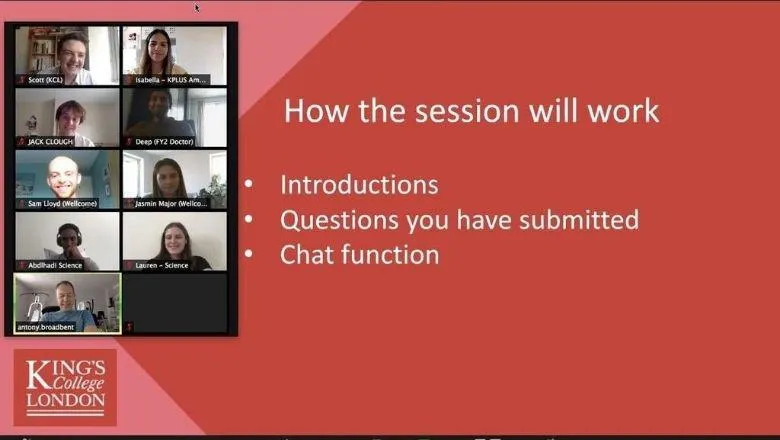As an undergraduate, I was the only female and the only person of colour in my class of 35. I was also one of the few coming from non-selective state schools. This presented many challenges, such as confidence, sense of belonging, networking opportunities. I really believe education should be for everyone and access to quality teachers and resources should be fundamental for all students.
Manya Sahni, PhD student in the Department of Mathematics and K+ Summer School tutor
20 August 2020
King's online summer schools support underrepresented students on their journey to university
King’s free summer schools have adapted to ensure young people are supported on their journey to university, despite COVID-19.

While school and college students cannot visit King’s campuses in person at the moment, King’s programme of free Summer Schools for A-level students have continued online, allowing young people to develop the skills they will need to apply and thrive at university.
Run by King’s Widening Participation department, K+ is a two-year free programme of events, activities and academic workshops for Year 12 students from non-selective schools in Greater London. K+ aims to support students’ university applications and enable young people to develop the skills needed to reach their potential as undergraduate students.
One of the highlights of K+ is the Spotlight Summer School, and this year was no different.
Spotlight Summer Schools took place online for three days during June and August, with sessions for students interested in applying to study Dentistry, Healthcare subjects, History and Politics, Languages and Literature, Law, Maths and Computer Science and Science subjects at university.
K+ participants took part in small group online tutorials with King's PhD students and academics, who supported them to complete their own academic project.
On two ‘Academic Days’ during the summer, K+ students joined lectures from King’s researchers and had the opportunity to ask questions afterwards.
‘I was the first in my family to go to university so it is important to me to support programmes like this’, said Dr Sarah Barry, a Senior Lecturer in Chemical Biology who gave an online lecture and live Q&A session.
As well as academic activities, summer school participants had the chance to discuss student life with King’s student ambassadors, joined a careers panel with representatives from sectors including the civil service, publishing and the media and attended an advice and guidance session about applying to university during COVID-19. Students also got creative as part of a summer school challenge to submit a self-portrait or a K+-themed construction, with entries including cakes, crochet and TikToks.

The transition to online teaching and learning presented challenges, but also new opportunities for students and researchers alike to learn and connect.
King’s academics adapted their teaching styles to the new online environment, using quizzes, true or false questions and Q&A sessions to gauge students’ understanding and prompt discussion of the topic.
Toju Ogbe, a PhD candidate in the King’s African Leadership Centre, found that students adapted to the online environment after leading tutorials for K+ students on ‘Leadership and Culture’.
‘After the first couple of online lessons, I and the students became much more comfortable in front of our computer screens and the level of engagement increased’, he explained. ‘The virtual learning sessions began to feel a lot more like a physical learning environment as students gained more confidence and participated in discussions.'
Managing to maintain such a sense of unity online is, frankly, impossible - yet it was managed...I can't quite believe just how well it went - not one thing went wrong. The impossible - pulled off!
K+ summer school participant
MedView and DentView summer programmes for Year 12 students interested in applying for Medicine or Dentistry also took place online in June, with workshops, mock lectures and clinical skills sessions designed to enhance applications to medical or dental school. Work experience is a key part of the MedView programme, so this year students observed final year medical students during online GP simulations. They then put this knowledge into practice during their own patient simulations.
King’s is also part of Realising Opportunities, a network of 15 research intensive universities who work together to promote fair access and social mobility. This year King’s academics will lead sessions for Realising Opportunities students across the UK as part of the network’s summer. Students who complete the programme are entitled to admissions benefits at all participating universities.
PhD candidate Manya Sahni has taught a course on the Quantum nature of black holes for K+ students interested in Maths and Computer Science for the past two years, and this year adapted her sessions to take place online.
Reading the final assignments of her students after the five-part online course was a highlight for her. ‘They were very high quality, especially a student who got 98%. It was like seeing perfection’, she said.
The last few months have given us the opportunity to overhaul our summer school, to make sure it could take place online whilst still giving K+’ers the skills to study at university and a sense of belonging with King's. It’s been brilliant to see this go so smoothly, with staff across Widening Participation and students from all faculties working together to create an environment where K+’ers could throw themselves into their academic projects, applications workshops and creative challenges!
Scott McGrory, Widening Participation Officer (K+)
Delivering the UN Sustainable Development Goals
King's College London has a long and proud history of serving the needs and aspirations of society. We are committed to the UN Sustainable Development Goals (SDGs) as a university, and we use them as a framework for reporting on our social impact. The SDGs are a set of 17 goals approved by the 193 member states of the United Nations (UN) which aim to transform the world by 2030. This initiative supports SDGs 4, 5 and 10.
